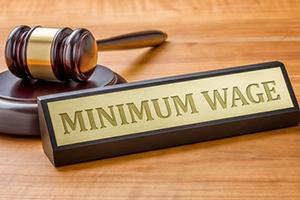of Employees
Minimum Wage
Understanding Your Right to Fair Pay

Every worker in New Jersey deserves to be paid fairly. For most employees, that means receiving at least the state’s minimum wage for every hour worked. Employers cannot avoid this obligation by asking you to work off the clock, requiring you to skip paid breaks, or by using job titles that make it seem as if this requirement does not apply.
At Rabner Baumgart Ben-Asher & Nirenberg, P.C., our attorneys help employees across Bergen County and throughout New Jersey to enforce their right to be paid the wages they have earned.
What is the Current Minimum Wage in New Jersey?
In 2026, the minimum wage for most employees in New Jersey is $15.92 per hour. In 2025, it was $15.49 per hour.
Different rules may apply to tipped employees, seasonal workers, and certain categories of agricultural employees. If you are unsure which rules apply to you, speaking with a Bergen County employment lawyer can help you understand your specific rights.
Who Qualifies for Minimum Wage Protection?
Most employees are covered by New Jersey’s wage laws, but there are many exemptions. These exemptions generally apply to higher-level or specialized roles that meet specific criteria.
Executive Employees
To qualify as exempt, you must:
- Primarily manage the company or a department.
- Regularly supervise at least two full-time employees (or the equivalent).
- Have authority over hiring, firing, or promotions, or play a significant role in those decisions.
Administrative Employees
This exemption applies only if:
- Your main duties involve office or non-manual work tied to business operations.
- You regularly exercise independent judgment on significant business matters.
Professional Employees
There are two recognized types:
- Learned professionals: Employees with advanced education who use specialized knowledge in their jobs.
- Creative professionals: Employees whose work requires originality, artistic talent, or invention.
To qualify under any of these categories, you also must be paid a salary rather than by the hour, and the salary has to be at least $684 per week ($35,776 per year).
Other exemptions may apply to outside sales employees, certain IT professionals, small-scale farm workers, and casual babysitters. However, these exemptions are narrowly defined, and many employers misclassify employees to avoid paying minimum wage.
Common Minimum Wage Violations
Some of the most frequent violations include:
- Asking employees to work before clocking in or after clocking out.
- Deducting pay for meal breaks when the employee is still working.
- Misclassifying employees as exempt or as independent contractors.
- Paying a flat salary that averages less than minimum wage when divided by hours worked.
If any of these apply to your situation, you may have a legal claim to recover unpaid wages.
Retaliation is Prohibited
Employees often are hesitant to raise concerns about wage violations out of fear of losing their jobs. Both federal and New Jersey laws, including the Fair Labor Standards Act (FLSA), the New Jersey Wage and Hour Law (NJWHL), and the New Jersey Wage Payment Law (NJWPL), protect employees from retaliation. Your employer cannot lawfully fire, demote, harass, or otherwise punish you for asserting your right to minimum wage.
Related Wage and Hour Claims
Minimum wage violations often overlap with other wage and hour issues:
- Overtime Pay: If you work more than 40 hours per week and are not exempt, then you should be paid time-and-a-half for your overtime hours. Employers who underpay minimum wage frequently also fail to properly pay overtime.
- Unpaid Wages: Even if your pay meets the minimum wage, you may have a separate claim if your employer fails to pay all of the wages you have earned, including commissions, bonuses, or other agreed-upon pay.
Why Contact a Bergen County Employment Lawyer?
Minimum wage disputes can be complex, especially when employers try to classify employees as exempt or independent contractors. A Bergen County employment lawyer can evaluate your situation, calculate what you are owed, and pursue recovery of unpaid wages through negotiation or litigation.
Speak with Our New Jersey Minimum Wage Attorneys
You should not have to fight for the wages you earned. If you have been denied minimum wage, overtime pay, or other compensation in New Jersey, Rabner Baumgart Ben-Asher & Nirenberg, P.C. can help.
Call us at (201) 777-2250 or contact us online to schedule a consultation with an experienced Bergen County employment lawyer.
Want to learn more? We recommend these articles from our Employment Law Blog:









